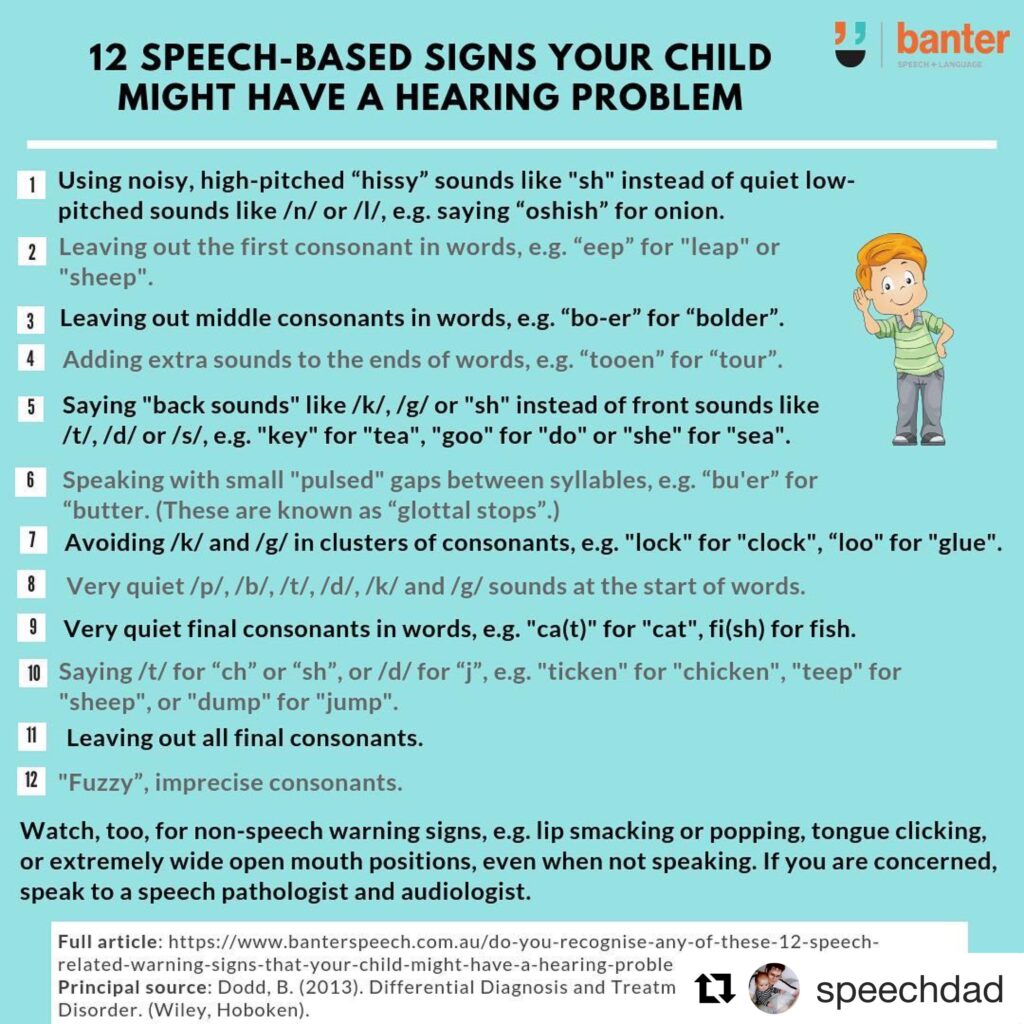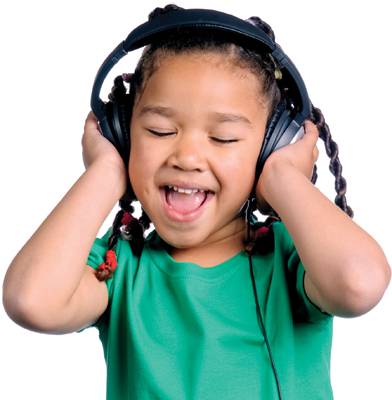Undiagnosed hearing problems can contribute to speech sound disorders, although there is some debate about how and to what extent – especially for conductive hearing loss caused by middle ear infections, also known as otitis media (see, e.g., Campbell et al., 2003).
Speech pathologists are trained to spot speech error patterns that are not typical developmental patterns. We need to know these signs so we can recommend hearing tests for these clients with a qualified audiologist.
So what are the signs? Watch out for these patterns:
1. Your child uses high frequency “hissy” sounds (fricatives) instead of lower frequency consonants, e.g. they say “oshish” for onion.
2. Your child leaves out the first consonant in words, e.g. they say “eep” for leap.
3. Your child leaves out the middle consonant in words, e.g. “bouer” for “bolder”.
4. Your child adds sounds to the end of words that aren’t meant to be there, e.g. “too-un” for “tour”.
5. Your child produces sounds that are usually produced towards the front of the mouth (e.g. /t, d/, /n/ or /s/), with sounds made at the back of the mouth (e.g. /k, g/ or /sh/), e.g. “cull” for “nail” – this is known as “backing”, the opposite of the common phonological process of “fronting”. It’s a red flag for unusual (i.e. not just delayed) speech sound development.
6. Your child inserts small gaps between syllables, instead of stops like /p/ or /t/, almost as if speaking with a Cockney accent, e.g. “bo-el” instead of “bottle. These are known as “glottal stops”.
7. Your child avoids /k/ and /g/ in clusters of consonants, e.g. “larce” instead of “glass”, though this can be hard to distinguish from the phonological process of cluster reduction.
8. You child says /p, b, t, d, k, g/ at the start of words very softly, instead of producing explosive puffs of air that normally accompany such sounds.
9. Your child produces very soft final consonants in words (though this can be hard to distinguish from the phonological process of final consonant deletion).
10. Your child says /t/ instead of “ch” or “sh”, or “d” instead of “j” (though this can be hard to distinguish from the phonological process of deaffrication).
11. Your child leaves out all final consonants.
12. Many of your child’s consonants are “fuzzy” and imprecise.
Some of the warning signs are easier to spot than others, and some mimic delayed developmental patterns, making them extra hard to detect, especially if your child’s speech sounds also evidence developmental delays.
For completeness, we should note that there are some other speech sound signs of potential hearing problems, but they are hard to explain without going into some technical details relating to phonetics. Additional non-speech warning signs to watch for are lip smacking, lip popping, tongue clicking and extremely wide open mouth positions, even when not speaking.
If you are concerned about whether your child’s hearing might be affecting his or her speech development, speak to your speech pathologist about it. And, if you and/or your child’s speech pathologist are in any doubt, it’s always a good idea to get a referral from your GP for your child to see a qualified audiologist for a full hearing assessment.
Your speech pathologist should be able to recommend an audiologist with experience working with children, or you can access a public database of Australian audiologists here.

Principal source: Dodd, B. (2013). Differential Diagnosis and Treatment of Children with Speech Disorder. (Wiley, Hoboken).
Image: http://tinyurl.com/p98guyh
Related articles:
- FAQ: 10 common speech sound error patterns seen in children of 3-5 years of age and when you should be concerned
- Important update: In what order and at what age should my child learn to say his/her consonants? FAQs

Hi there, I’m David Kinnane.
Principal Speech Pathologist, Banter Speech & Language
Our talented team of certified practising speech pathologists provide unhurried, personalised and evidence-based speech pathology care to children and adults in the Inner West of Sydney and beyond, both in our clinic and via telehealth.


Leave a Reply